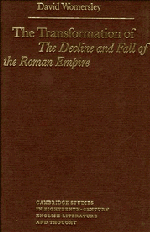Book contents
- Frontmatter
- Contents
- Acknowledgements
- A note on references and quotations
- Introduction
- PART I The historiography milieu
- PART II The Decline and Fall of the Roman Empire
- 3 Introduction
- Volume 1 - 1776
- Gibbon among the philosophers
- Volumes II and III - 1781
- 9 ‘The more rational ignorance of the man’
- 10 Julian the Apostate
- 11 Ammianus Marcellinus
- 12 ‘The nice and secret springs of action’
- Volumes IV, V and VI - 1788
- Appendix
- Bibliography
- Index
11 - Ammianus Marcellinus
Published online by Cambridge University Press: 05 September 2013
- Frontmatter
- Contents
- Acknowledgements
- A note on references and quotations
- Introduction
- PART I The historiography milieu
- PART II The Decline and Fall of the Roman Empire
- 3 Introduction
- Volume 1 - 1776
- Gibbon among the philosophers
- Volumes II and III - 1781
- 9 ‘The more rational ignorance of the man’
- 10 Julian the Apostate
- 11 Ammianus Marcellinus
- 12 ‘The nice and secret springs of action’
- Volumes IV, V and VI - 1788
- Appendix
- Bibliography
- Index
Summary
For to all the observations of the Ancients, wee have our owne experience: which, if wee will use, and apply, wee have better meanes to pronounce. It is true they open'd the gates, and made the way that went before us; but as guides, not Commanders …
JonsonGibbon's relationship with Ammianus Marcellinus, by far the most important of his sources in the second instalment of The Decline and Fall, also reveals the transitional nature of Volumes II and III. The Englishman's attitude to his Roman guide betrays his anxieties and concerns about narrative, while revealing the change in his view of historiography from seeing it as an exercise in authoritative orchestration to appreciating it as an undertaking in which the control and composure of the historian are jeopardised. In the various use Gibbon makes of Ammianus, we find once more, as we found in the portrait of Julian, the vestigial allure of philosophic historiography together with an appreciation of all the aspects of these difficult centuries which ever more peremptorily challenge that idiom.
The reader of The Decline and Fall is likely to be most aware of Gibbon's reliance on ‘the military historian’ in a passage which occurs long after his most extended use of the Res Gestae (a section of The Decline and Fall bounded by Chapters XIX and XXVI).
- Type
- Chapter
- Information
- The Transformation of The Decline and Fall of the Roman Empire , pp. 169 - 181Publisher: Cambridge University PressPrint publication year: 1988



